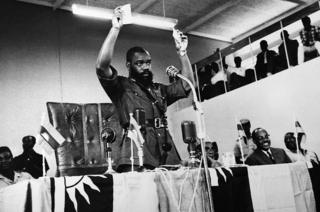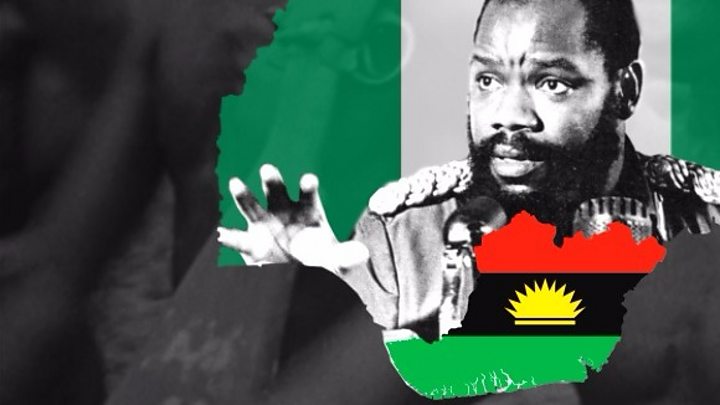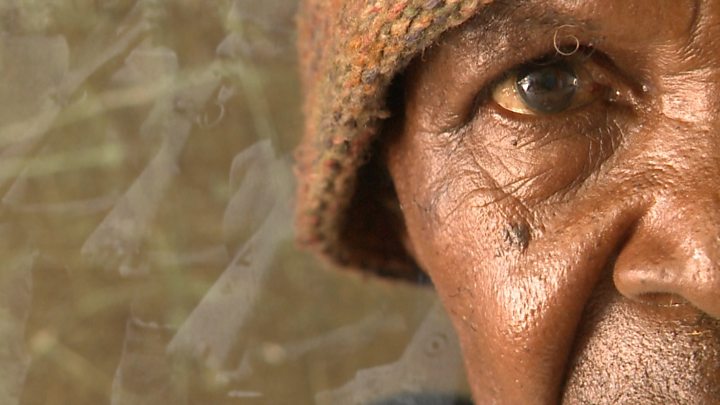
Translating…
 Image copyright Keystone-France
Image copyright Keystone-France 
The deaths of larger than a million of us in Nigeria on myth of the brutal civil battle which ended exactly 50 years ago are a scar in the nation’s ancient previous.
For plenty of Nigerians, the battle over the breakaway negate of Biafra is frequently regarded as as an melancholy episode most spirited forgotten, but for the Igbo of us who fought for secession, it remains a life-defining occasion.
In 1967, following two coups and turmoil which resulted in about a million Igbos returning to the south-east of Nigeria, the Republic of Biafra seceded with 33-300 and sixty five days-passe militia officer Emeka Odumegwu Ojukwu on the helm.
The Nigerian government declared battle and after 30 months of combating, Biafra surrendered. On 15 January 1970, the battle formally ended.
The federal government’s policy of “no victor, no vanquished” also can dangle resulted in a lack of legitimate reflection, but many Nigerians of Igbo initiating set apart grew up on tales from of us who lived via the battle.
Three of of us who had been mad by the secessionist campaign dangle been sharing their recollections.
‘We thought we had been magicians’
Christopher Ejike Previously, soldier
He had simply accomplished grammar college and started training as a veterinary assistant on the University of Nigeria, Nsukka (UNN), in south-eastern Nigeria, when the civil battle began.
Almost every pupil he knew turned fragment of the battle effort.
He joined the Biafran military and was once assigned to the impress unit, whose tasks included “active intelligence and eavesdropping on the Nigerian militia”.
Christopher Ejike Previously
The Nigerians who had been pursuing us had been expert soldiers… We had been drafted into the battle, given two days’ training.”
“We thought we had been magicians,” acknowledged 76-300 and sixty five days-passe Mr Previously.
“The Nigerians who had been pursuing us had been expert soldiers. We had been no longer. We had been drafted into the battle, given two days’ training.
“Plus the incontrovertible truth that we had been hungry. Some of us, our pores and skin was once getting corrupt. No one can battle a battle treasure that.”
In January 1966, some senior Nigerian military officers, largely of the Igbo ethnic neighborhood, assassinated key politicians for the interval of a coup in the West African negate.
Those killed included Ahmadu Bello, a revered chief in the north.
This resulted in months of massacres towards the Igbo living in the north. Tens of thousands had been killed whereas about a million fled to what was once then is named the Jap Situation.
These events sparked the Igbo’s choice to secede, spearheaded by Ojukwu, who was once then the militia governor of the Jap Situation.
In the months preceding the battle, Ojukwu continually visited UNN, the correct university in south-eastern Nigeria on the time, to meet with students and put together them for secession.
Mr Previously appeared ahead to those visits, and joined the crowd who gathered on the university’s Freedom Square.
“Once his helicopter touched down, everybody went there and, nearly, college shut down.
“He had this amazing sense of humour. He spiked everybody up and we shaped songs and had been singing and participating in ourselves.”
In the primary 300 and sixty five days of the battle, the Nigerian government captured the coastal metropolis of Port Harcourt and imposed a blockade, which lower meals affords to Biafra.
Mr Previously remembers the overwhelming starvation that in most cases forced Biafran soldiers to use and eat mice. He also remembers the closing 300 and sixty five days of the battle when his unit was once consistently on the lag, fleeing the advancing Nigerian military.
“Someplace in the midst of the battle,” he acknowledged, “the Biafrans made some dramatic successes that gave us hope that we would perchance defend the Nigerians except in spite of every little thing some aid from out of doorways came.”
By wearisome 1969, all hope was once lost.
Biafra timeline
- January 1966 – Nigerian government overthrown in what was once viewed as an “Igbo coup” led by junior military officers
- January 1966 – Lt Col Odumegwu-Ojukwu appointed militia governor of Jap Situation
- July 1966 – Second coup masterminded by Murtala Muhammed, Lt Col Yakubu Gowon becomes head of negate
- June to October 1966 – Riots in northern Nigeria centered at Igbos, killing many and forcing as much as a million to return to south-eastern Nigeria
- Could 1967 – Ojukwu proclaims independence of the Republic of Biafra
- July 1967 – Battle begins
- October 1967 – Biafran capital Enugu falls
- Could 1968 – Nigeria captures oil-rich Port Harcourt
- April 1969 – Umuahia, contemporary Biafran capital falls to Nigerian forces
- Jan 1970 – Ojukwu flees Nigeria
- Jan 1970 – Biafra surrenders
Mr Previously left the military and went trying to construct up his family, whom he had no longer heard from in larger than two years.
He nonetheless his share from an allocation of uncooked rice to his unit, then set off towards the village of a relative, where he suspected his of us and siblings would possibly perchance well well perchance be holed up.
“I needed to defend the rice whereas starving myself, carrying it across rivers and forests except I discovered them,” he acknowledged.
A quantity of his chums and classmates had died on the battlefront. However his family was once happy to stare that the son and brother they assumed lifeless was once alive. And in addition they had been overjoyed that he had turned up with meals.
Starvation killed extra Biafrans than bullets and bombs.
When the university was once reopened about a months after the battle ended, Mr Previously returned to UNN, at closing graduating with a stage in plant and soil science.
“I feel we would dangle accomplished larger if we had dealt with it with a petite bit bit extra intelligence,” acknowledged Mr Previously. “I feel now that Ojukwu… thought he was once Jesus Christ.
“He thought he would possibly perchance well well perchance prevail in magic. If he had slowed down and allowed some of us who had been with him to repeat him successfully, we would dangle reach out larger than we did.”
‘They most spirited had knives and cutlasses’
Felix Nwankwo Oragwu, scientist
He was once a physics lecturer at UNN when the civil battle began.
For the next 30 months, he headed the Analysis and Production (RAP) neighborhood comprising Igbo scientists from a total lot of fields.
Its primary responsibility was once to manufacture technological reinforce to the Biafran military, which was once poorly equipped.
Felix Nwankwo Oragwu
When the battle started, there was once no longer a single weapon… any place for the interval of Biafra. No gun, no bomb, no nothing.”
The RAP’s most valuable product was once the “ogbunigwe”, a weapons launcher of noteworthy and devastating prevail in which influenced the tip result of many battles in Biafra’s favour, in accordance with ancient reports.
“With out us, the battle would dangle lasted most spirited about 30 hours,” acknowledged the 85-300 and sixty five days-passe.
“When the battle started, there was once no longer a single weapon either in a store or any place for the interval of Biafra. They most spirited had knives and cutlasses. No gun, no bomb, no nothing.”
In the aftermath of the battle, the Nigerian government did no longer desire to impose any construct of collective punishment.
Nonetheless, the Igbo faced some devastating penalties, particularly economically as the Biafran currency that folks had accumulated turned worthless.
Many Igbo nonetheless feel sidelined in Nigerian politics, as on myth of the civil battle no-one from the ethnic neighborhood has change into president.
Growing cries of marginalisation dangle led in contemporary times to the emergence of Igbo groups agitating yet all over again for secession, particularly the Indigenous Of us of Biafra (Ipob), shaped by UK-based entirely British-Nigerian Nnamdi Kanu.

Media playback is unsupported on your instrument
Mr Oragwu needs that the Igbo had paid less consideration to the lumber for energy on the centre, and as an alternative renowned their pickle by advancing the technological gains of the battle.
“Biafra would dangle been a technological nation and would dangle been ready to compete with any one,” he acknowledged, madden in his affirm.
“That is what makes me unhappy. By this time, we would dangle been competing with in spite of every little thing South Korea.”
The scientist’s wartime accomplishments had caught the glory of the Nigerian authorities and he was once invited by the government to pioneer a diversified science and technology programme for the country.
He was once in the aid of the atmosphere up of 4 universities of science and technology in diversified areas of Nigeria and after retirement he published Scientific and Technological Innovations in Biafra, a e book he hoped would inspire younger Nigerians.
“Nigeria was once programmed by the British colonial authorities no longer to participate in production and form of global applied sciences,” he wrote in the e book.
“The battle gave the assorted to… reject the colonial originate.”
‘An improbable interval’
Edna Nwanunobi, trainer
She was once instructing English and French in a secondary college in Port Harcourt in southern Nigeria when the civil battle began.
Whereas the UK backed Nigeria, France was once essentially the most renowned supporter of Biafra.
However English was once extra widely spoken in Biafra, so translators had been wanted every time French officers visited Ojukwu.
Edna Nwanunobi
“You had been forced to fraternise alongside with your of us larger than any time sooner than”
Ms Nwanunobi joined the Biafran ministry of international affairs as fragment of a handful of translators who labored precise now with Ojukwu.
“The battle was once an fundamental interval,” acknowledged 82-300 and sixty five days-passe Mrs Nwanunobi. “All individuals was once forced to lag home so you had been forced to fraternise alongside with your of us larger than any time sooner than.
“And of us who labored in every Biafra pickle of job had been excessive stage of us. These had been of us who had been doing all kinds of issues and the battle forced them out of their positions.”
She loved working precise now with the Biafran chief, whom she and her colleagues fondly known as “Brother OJ”.

Media playback is unsupported on your instrument
“He was once a truthful particular person,” she acknowledged time and all over again. “And he was once disciplined. If any meeting lasted larger than two hours, he would no longer be occasion to it.”
Her most memorable assignment occurred after the Biafran militia captured six Italian oil workers employed by the Nigerian government.
Officers from diversified European countries travelled to meet Ojukwu to charm for their commence.
“That was once the greatest meeting we had,” she recalled. “Even the Vatican sent representatives.”
All the map via the meeting, Mrs Nwanunobi conveyed to Ojukwu that he stood the threat of shedding European reinforce.
He promised to mediate the subject, and the Italians had been therefore launched.
Mrs Nwanunobi met Ojukwu for the closing time on 23 December 1969, when she lined up out of doorways his pickle of job with her colleagues, to construct up a Christmas gift and a handshake from him.
About a days later, she left the country for the Biafran pickle of job in Paris. All the map via a stopover of a total lot of days in Lisbon, she heard that Biafra had surrendered.
Her first narrate was once for Ojukwu.
“I was once anxious that he would reach to hurt,” she acknowledged softly. “I did no longer desire any one to shame him.”
Her grief lifted when she discovered that her boss had escaped in his interior most jet, and was once granted asylum by Ivory Cruise, a francophone country.
Mrs Nwanunobi spent noteworthy of the 1970s in Canada sooner than returning to Nigeria in 1977, where she resumed work as a secondary college trainer.
Ojukwu himself remained in exile for 13 years. After he was once formally pardoned by the Nigerian government, he returned in 1982, with multitudes pouring onto the streets of his home negate of Anambra to welcome him.
He died in November 2011 and was once given a fat militia burial in a ceremony attended by then Nigerian President Goodluck Jonathan, some diversified African leaders and contributors of the diplomatic corps.
Fifty years after the Biafran battle, Nigeria is nonetheless combating to defend its solidarity, with a total lot of groups, no longer simply the Igbo, calling for the restructuring of Africa’s most populous negate.
It would possibly perchance well well perchance be for this goal that the battle is barely talked about.
The federal government has nothing to execute by reminding Nigerians that secession came about sooner than and also can additionally be tried all over again.
